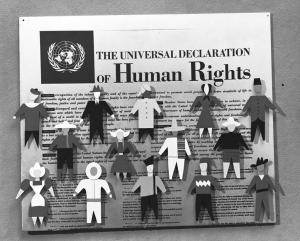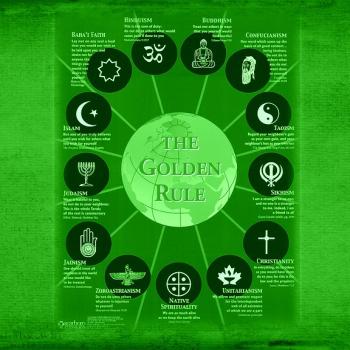
After the Angelus on December 10th, Pope Francis spoke on the Seventy-Fifth anniversary of the Universal Declaration of Human Rights, which, at the time of its creation, promoted a new way of engaging the world, one in which human dignity and the rights which is accorded with it should be promoted and defended. Religious liberty, freedom of speech, freedom from fear, and freedom from undue want, are basic rights which should be granted to everyone. In the last seventy-five years, much good has been accomplished because of the Universal Declaration of Human Rights, but sadly, attacks on human dignity, and with them, human rights, continue to confront us, requiring us to promote and rededicate ourselves to the basic principles which lay behind the declaration:
Seventy-five years ago, on 10 December 1948, the Universal Declaration of Human Rights was signed. It is like a master plan. Many steps have been taken, many still need to be made, and unfortunately, at times, steps backward have been taken. The commitment to human rights is never finished! In this regard, I am near all those who, without fanfare, in concrete daily life, fight and personally pay the price defending the rights of those who do not count.[1]
War, certainly, is a time of trial and tribulation. Someone tries to unjustly dominate and control another, denying those they deem to be other than themselves basic human dignity and the rights which flow from it. This is why it was appropriate for Pope Francis to mention, in the same address, the wars going on in the world today:
And we continue to pray for the populations who are suffering because of war. We are heading toward Christmas: Are we able, with God’s help, to take concrete steps of peace? It is not easy; we know that. Certain conflicts have historically deep roots. But we also have the testimony of men and women who have worked wisely and patiently for peaceful coexistence. Let their example be followed! Let every effort be put toward addressing and removing the causes of conflict, while at the same time – speaking of human rights – protecting civilians, hospitals, places of worship, freeing hostages and guaranteeing human rights. Let us not forget battered Ukraine, Palestine, Israel.[2]
Putin’s war against Ukraine undermines human rights; he has no care or concern for the good of the people living in the land he invaded. What he wants is to control them, to force them to follow him and his whims or to be eradicated. He has no interest in religious liberty, as can be seen in the way Russia attacks religious liberty in Ukraine: “Russian occupation authorities have banned the Ukrainian Greek Catholic Church and other Catholic ministries in occupied areas of Ukraine’s Zaporizhzhia region, according to the church’s main communications office in Kyiv.”[3] It also denies the Catholic Church the ability to send charitable aid into the region, making sure those who live there suffer needlessly: “Also banned by the order were the Knights of Columbus and Caritas, the official humanitarian arm of the universal Catholic Church.”[4]
Similarly, we see in the conflict between Israel and Hamas, innocent civilians, hospitals, and the like, are being unjustly targeted and destroyed. There is the need to protect and defend innocents on both sides, but it must be clear, such defense must be done in an ethical way, one which follows basic conventions of war. Disproportionate responses to assault, where the “defense” ends up being worse than the initial attack must be denounced, especially when the response engages war crimes. Neither side of the conflict should dehumanize the innocents who have no power or ability to stop the war coming from the other side. No side should use rhetoric which suggests the only possible end to the war is the total eradication of the enemy, that is, the people coming from the other side of the conflict. Anyone who would promote the total annihilation of Israelis or Palestinians, or deny the basic human rights of either, must be resisted. We must look for a resolution to the war, and that means, we must promote those of good will who want to come together and build a just peace. Anyone who would deny such a peace should be removed from positions of power and authority. Obviously, the historical context, the way Jews and Palestinians alike have experienced dehumanization and abuse, has led, in part, to the current conflict, as warmongers on both sides have used their past experience to generate fear and use that fear to justify doing the unjustifiable (doing to someone else what was once done to them).
No one should be denied their basic human dignity. Political rhetoric which dehumanizes others, be it against the poor living within one’s own country, against migrants seeking a better life for themselves, or against people of different religious beliefs, must be rejected. Certainly, from a Christian stand point, the love God has for humanity shows no one should ever be seen as unworthy of basic human rights:
No human being should be considered worthless by another. That nature which the Creator of the universe made his own should not be looked down upon in anyone. Is it permitted for any of the hired hands to refuse that payment which the Lord declares to have been given him? Your fellow servant receives assistance, and the Lord returns thanks. Food for someone in need is the cost of purchasing the kingdom of heaven, and the one who is generous with temporal things is made heir of the eternal. [5]
This is why Christians can be and should be front in center working for the promotion of human dignity and the rights which flow from it. This is also why it is important for Christians to promote the good connected with the Declaration of Human Rights, realizing and accepting that in the past, they often were the ones who undermined such rights. Their actions must, in a way, be for restorative justice, doing penance for the evil Christians have done in the past such as those associated with colonization or the denial of religious liberty in various so-called Christian countries. For, in promoting human dignity, Christians would be promoting the dignity of human nature, the nature which Christ assumed, the nature which God said was good, and a nature which was made in the likeness of God (which is why, when it is attacked, God can also be said to be attacked).
[1] Pope Francis, Angelus (12-10-2023).Vatican translation.
[2] Pope Francis, Angelus (12-10-2023).Vatican translation.
[3] Gina Christian, “Russia Bans Ukrainian Greek Catholic Church, Catholic Ministries In occupied Region Of Ukraine” in National Catholic Reporter (12-7-2023).
[4] Gina Christian, “Russia Bans Ukrainian Greek Catholic Church, Catholic Ministries In occupied Region Of Ukraine.”
[5] St Leo the Great, Sermons. Trans. Jane Patricia Freeland CSJB and Agnes Josephine Conway SSJ (Washington, DC: CUA Press, 1996), 40 [Sermon 9].
Stay in touch! Like A Little Bit of Nothing on Facebook.
If you liked what you read, please consider sharing it with your friends and family!
N.B.: While I read comments to moderate them, I rarely respond to them. If I don’t respond to your comment directly, don’t assume I am unthankful for it. I appreciate it. But I want readers to feel free to ask questions, and hopefully, dialogue with each other. I have shared what I wanted to say, though some responses will get a brief reply by me, or, if I find it interesting and something I can engage fully, as the foundation for another post. I have had many posts inspired or improved upon thanks to my readers.












